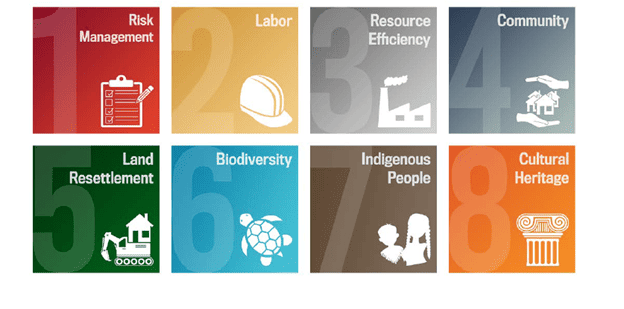
- What is Environmental and Social Governance (ESG)?
ESG is an abbreviation for Environmental, Social and Governance where:
Environmental: company impacts on the environment e.g. water and energy management and efficiency, land use, waste generation, pollution prevention on land, air and water, biodiversity, natural resource conservation, etc.
Social: company relationship with its employees and communities, e.g. attitudes on diversity, equity, gender and inclusion, anti-discrimination, occupational health and safety, human rights, prevention of slavery/forced labor, protection of cultural heritage, the health and safety of communities affected by the company operations, consumer protection, etc.
Governance: structures and processes by which companies are directed and controlled. This makes companies more accountable and transparent and is instrumental to effectively managing environmental and social risks. This includes risk management including oversight of environmental and social risks, anti-corruption controls, board diversity and effectiveness, avoiding conflicts of interest, crime and illegal practices etc.
There is evidence that integrating ESG factors into companies’ operations enhances their long-term economic performance, reduces ESG-related financial risks, guards against interruptions in project execution, and avoids or minimizes negative impacts on the environment, employees and communities.
- How Does KKCF Consider Environmental and Social Safeguards?
To ensure that KKCF does not cause harm to the environment or people, KKCF-supported projects need to:
- Avoid, mitigate and manage risks and impacts as a way of doing business in a sustainable way;
- Contribute to positive social and environmental impacts, where possible;
- Through implementation of good environmental and social practices, to ensure that sustainable development impacts of the business activities are enhanced.
As an IFC project, KKCF must comply with the IFC Performance Standards on Environmental and Social Sustainability. To this end,
- KKCF Environmental, Social and Grievance specialist conducts due diligence on all applicants before contracting, in line with IFC Performance Standards.
- The grantee has the ultimate responsibility to manage environmental and social risks, but KKCF provides all companies with tools, customized assistance and training.
- After contracting, KKCF conducts regular monitoring of environmental and social risk management in line with IFC Performance Standards and recommends corrective actions.
The 8 Themes of the IFC Performance Standards

- KKCF Compliance with Performance Standards (PS)
PS 1: Assessment and Management of Environmental and Social Risks and Impacts.
KKCF is committed in adhering to PS 1 by;
- Identifying, assessing, evaluating projects E&S risks and impacts at the program level and in single projects on an ongoing basis.
- Adopting a mitigation hierarchy: i.e anticipate and avoid environmental and social impacts, and where avoidance is not possible minimize, and where residual impacts remain, compensate/offset for risks and impacts to workers, Affected Communities and the environment.
- Adoption of an Environmental and Social Management System (ESMS) at the fund level.
- Stakeholder engagement. Engagement through disclosure and consultation with the affected communities and other stakeholders throughout the project cycle. This also includes communication and the KKCF and company-level grievance mechanisms.
- Ensuring companies adopt differentiated measures so that adverse impacts do not fall disproportionately on the vulnerable/disadvantaged.
- Supported companies must also comply with applicable national and county government legal requirements.
PS 2: Labor and Working Conditions
KKCF is committed in adhering to PS 2 by
- Encouraging the companies supported by KKCF to promote fair treatment, non-discrimination, and equal opportunity for all workers.
- Encouraging companies to maintain good worker-management relationship.
- Ensuring that companies comply with Kenyan national employment and labor laws.
- Protecting workers, in particular vulnerable categories.
- Promoting occupational health and safety standards at the work place.
- Requiring KKCF grantees to avoid forced labor and child labor, and put measures in place to prevent gender-based violence and harassment.
- Supporting principles of freedom of association and collective bargaining of workers.
- Promoting a robust worker grievance redress mechanism, including anonymous reporting of grievances.
PS 3: Resource Efficiency and Pollution Prevention
KKCF is committed in adhering to PS 3 by
- Building the capacity of KKCF grantees on pollution control and resource efficiency.
- Requiring grantees to avoid, minimize and reduce project-related pollution.
- Where feasible, encouraging the KKCF investees to adopt green energy as a way of reducing their Green House Gas emissions.
- Promoting more sustainable use of resources, especially water and energy.
- Encourage recycling and re-use of waste, thus promoting circular economy.
- Avoiding, minimizing or reducing project-related impacts on human health and environment due to pollution (air, water, land, noise, etc).
- Requiring companies to avoiding or minimize generation of hazardous and non-hazardous waste, as well as safe disposal of such waste once generated
PS 4: Community Health, Safety and Security
KKCF is committed in adhering to PS 4 by
- Building the companies’ capacity to anticipate and avoid adverse impacts on the health and safety of the affected community (both routine and non-routine circumstances).
- Encouraging KKCF grantees to safeguard personnel and property in accordance with the relevant human rights principles.
- Promoting quality, safety and climate change considerations in the design and construction of infrastructure.
- Encouraging companies to avoid or minimize exposure to project related traffic, road safety risks, diseases, hazardous materials etc.
- Requiring KKCF grantees to have in place measures for emergency response
PS5: Land Acquisition and Involuntary Resettlement
KKCF is committed in adhering to PS 5 by;
- Avoiding, minimizing adverse social and economic impacts from land acquisition or restriction on land use.
- Avoiding and minimizing project-related physical and economic displacements as a result of land acquisition.
- Encouraging alternative project designs to avoid land acquisition that would result in displacement of people.
- Requiring companies to improve or at least restore livelihoods and standards of living of the affected people in cases where involuntary resettlement took place.
- Ensuring planned implementation and appropriate disclosure of information, meaningful consultation and informed community participation.
PS 6: Biodiversity Conservation and Sustainable Management of Living Natural Resources.
KKCF is committed in adhering to PS 6 by;
- Encouraging protection and conservation of biodiversity by KKCF investees by requiring companies to assess relative risks.
- Maintaining the benefits from ecosystem services (the benefits that people, including businesses, derive from ecosystems).
- Promoting sustainable management of living natural resources through the adoption of practices that integrate conservation needs and development priorities.
- Where possible, encouraging tree planting and other greening initiatives among KKCF investees.
PS 7: Indigenous Peoples
PS 7 recognizes that Indigenous Peoples, as social groups with identities that are distinct from mainstream groups in national societies, are often among the most marginalized and vulnerable segments of the population. As such, they tend to be more vulnerable to adverse impacts associated with project development. KKCF is committed to adhering to PS 7 by
- Ensuring full respect for Indigenous Peoples’ human rights, dignity, aspirations, culture, knowledge, practices and natural resource-based livelihoods.
- Anticipate and avoid adverse impacts on Indigenous Peoples; where avoidance is not possible, minimize such impacts.
- Encouraging KKCF grantees to establish and maintain an ongoing relationship based on informed consultation and participation with project-affected Indigenous Peoples throughout the project cycle.
- Encouraging KKCF grantees to promote sustainable development benefits and opportunities for Indigenous Peoples in a culturally appropriate manner.
- Encouraging Free Prior and Informed Consent (FPIC) in certain circumstances.
PS 8: Cultural Heritage
Cultural heritage refers to (i) tangible forms of cultural heritage, such as tangible moveable or immovable objects, property, sites, structures, or groups of structures, having archaeological (prehistoric), paleontological, historical, cultural, artistic, and religious values; (ii) unique natural features or tangible objects that embody cultural values, such as sacred groves, rocks, lakes, and waterfalls; and (iii) certain instances of intangible forms of culture that are proposed to be used for commercial purposes, such as cultural knowledge, innovations, and practices of communities embodying traditional lifestyles.
KKCF is committed in adhering to PS 8 in the following way:
- Encouraging KKCF investees to protect and preserve cultural heritage from the adverse impacts of their activities.
- Where the proposed location of a project is in areas where cultural heritage is expected to be found, either during construction or operations (to be determined through environmental and social assessment), the company must develop a chance find procedure, which will be applied in the event that cultural heritage is subsequently discovered.